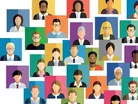Unilever aims to raise living standards across value chain

Unilever announced sweeping commitments and actions “to help build a more equitable and inclusive society” by raising living standards across its value chain. The British multinational consumer goods company , headquartered in London, UK, aims to create opportunities through inclusivity, and preparing people for the future of work.
“The two biggest threats that the world currently faces are climate change and social inequality,” said Unilever CEO Alan Jope. “The pa st year has undoubtedly widened the social divide, and decisive and collective action is needed to build a society that helps to improve livelihoods, embraces diversity, nurtures talent, and offers opportunities for everyone.
“We believe the actions we are committing to will make Unilever a better, stronger business; ready for the huge societal changes we are experiencing today – changes that will only accelerate. Without a healthy society, there cannot be a healthy business.”
Unilever’s main commitments include:
- Ensuring that everyone who directly provides goods and services to the company earns at least a living wage or income, by 2030
- Spending €2 billion annually with suppliers owned and managed by people from under-represented groups, by 2025
- Pioneering new employment models for employees and equipping 10 million young people with essential skills to prepare them for job opportunities, by 2030
Unilever says ensuring people in the value chain earn a living wage or income is a critical step towards building a more equitable and inclusive society. There is also a direct benefit to the economy, through consumer spending, job creation, improving job productivity and quality.
The company will focus on the most vulnerable workers in manufacturing and agriculture – working with suppliers, other businesses, governments and NGOs to create systemic change and global adoption of living wage practices.
Equity, Diversity and Inclusion strategy
Unilever also sees diversity as a critical factor and has introduced a new Equity, Diversity and Inclusion strategy to remove barriers and bias in recruitment and aiming to achieve a workforce that reflects the population in the countries where they operate.
This commitment extends to spending €2 billion annually with diverse suppliers by 2025. These suppliers will be small and medium-sized businesses owned and managed by women, under-represented racial and ethnic groups, people with disabilities and LGBTQI+.
Helping young people acquire essential skills
On the skills and training front, Unilever will ensure all employees are reskilled or upskilled by 2025, and will pioneer new employment models. It will offer “new ways of working, to offer both security and flexibility”.
Looking beyond the company’s workforce, Unilever says it will help 10 million young people acquire essential skills for future jobs. It will also grow its apprenticeship schemes around the world, and work with suppliers and distributors to build vocational skills to help young people to get into work.
Professor John Ruggie, Harvard University, Former UN Secretary General’s Special Representative for Business and Human Rights, member of the Unilever Sustainability Advisory Council, commented: “The right to an adequate standard of living is a fundamental human right – sadly one that many of millions of people around the world are unable to access.
"Decent work, enough to adequately maintain yourself and your family not only helps people escape poverty but helps economic and social development too. So I commend Unilever for its foresighted announcement today as it continues the evolution of its social ambition, founded on the respect for human rights.”



